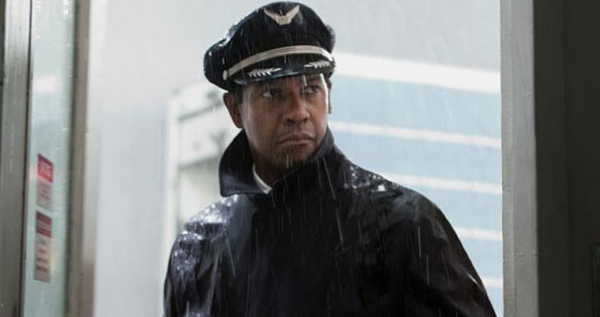Movie review by Greg Carlson
“Flight” is a tale of two movies. In the first, technical craftsman and special effects-focused veteran Robert Zemeckis constructs a lollapalooza of a doomed commercial airliner crisis. In the second, Denzel Washington battles the demons of alcoholism in an old-school social morality play. Altogether, the movie’s running time comes in at just under two hours and twenty minutes, a mark of its unnecessary sense of self-importance, but audience members looking for a character study could do worse than what amounts to a made-for-TV, grown-up after-school special enhanced by the presence of an A-list star and a huge production budget.
Boozehounds are attractive to actors for a variety of reasons, and potential award recognition probably ranks on the list. Nine men have won Oscars playing alcoholics from a pool of many more nominations. Tim Dirks, Emanuel Levy and others have pointed out that all five 1983 Academy Award Best Actor nominees played “drunks of one kind or another.” As a two-time Oscar winner, Washington doesn’t need any more golden hardware to remind us of his status, but his turn as Captain Whip Whitaker has a good shot at earning his sixth performance nomination.
The dependably watchable Washington is surrounded by a group of terrific supporting players, including Bruce Greenwood as a pilot union representative, Kelly Reilly as the recovering addict who moves in with Whip post-crash, and John Goodman as a funny, scene-stealing Dr. Feelgood. Unsurprisingly, Don Cheadle makes a perfect criminal defense attorney brought in to help exonerate Whip by, among other things, working to suppress a damning toxicology report. Cheadle’s Hugh Lang makes no secret of his disgust at Whip’s irresponsibility, and the actor’s handful of scenes with Washington remind viewers of their chemistry in the excellent “Devil in a Blue Dress.”
One of the most thought-provoking questions raised by John Gatins’ screenplay seriously considers whether Whip’s chemically altered state actually prevented a greater loss of life. Lang explains that pilots in ten FAA simulations of the crash failed to successfully land, but for whatever reason, Whitaker was able to avoid total catastrophe – even though several people lost their lives. “Flight” flirts not so much with the possibility of divine intervention, but rather the existential crisis that arises when Whitaker must decide whether to accept responsibility or allow someone else – a very specific, innocent someone else – to take the fall for the vodka bottles found in the aircraft’s trash.
Even though the movie will almost certainly be missing as an in-flight airline viewing option, I’ll take Zemeckis films with flesh and blood performers over soulless, uncanny valley motion capture animation any day. The last live-action movie Zemeckis made was “Cast Away,” in 2000. That film also featured a terrifying plane crash sequence. That said, “Flight” relies too often on formulaic explorations of the distance between heroism and the need for redemption. Whip’s post-crash struggles to stop drinking, even against the increasingly tense backdrop of the ongoing federal investigation and an upcoming NTSB hearing that will determine the captain’s fate, simply cannot compete with the initial rush of the movie’s thrilling depiction of every traveler’s worst nightmare.
